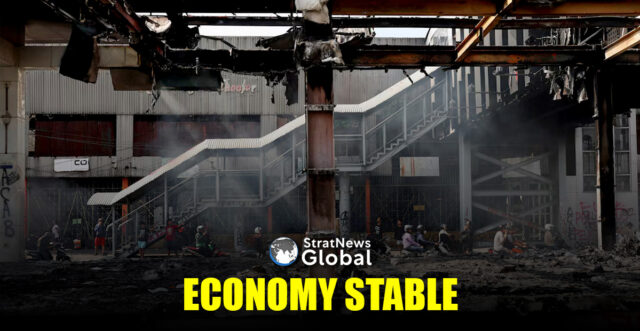Indonesia’s financial authorities on Monday stressed that the country’s economic foundations remain sound, even as political unrest triggered declines in the stock market and put pressure on the currency.
The main stock index fell more than 3% in opening trades before regaining some of the losses. The rupiah , which fell 0.9% against the dollar on Friday as the protests escalated, firmed slightly on Monday morning after the central bank vowed to defend the currency.
Chief economic minister Airlangga Hartarto said the economy was fundamentally solid and would get a boost from a planned incentive package, promising to “minimise the impact” on the economy of the protests, in which at least eight people have died.
“We hope for a peaceful and respectful situation that will support economic recovery,” Airlangga said at a joint press conference with the Indonesia Stock Exchange and financial services regulator.
Students and civil society groups called off planned protests on Monday, citing heightened security measures. The demonstrations spread across Indonesia last week, initially over lawmakers’ benefits before they intensified after a police vehicle hit and killed a motorcycle taxi driver on Thursday night.
‘Economy Stable, Though Not Outstanding’
President Prabowo Subianto has ordered the military and police to take stern action against rioters and looters, after homes of political party members and Finance Minister Sri Mulyani Indrawati were ransacked. Some state buildings and public facilities such as toll booths in several cities were set ablaze.
“We see that recovery and market confidence in the coming days will be strongly determined by how quickly social, political, and security issues are addressed,” Rully Arya Wisnubroto, an analyst with brokerage Mirae Asset Sekuritas Indonesia, said in a note to clients.
“Indonesia’s economic conditions are relatively stable, though not outstanding. If investor confidence is not restored, short-term economic instability may occur,” he added.
The economy grew by an annual 5.12% in the second quarter, the fastest pace in two years, according to official data.
Airlangga said a programme giving free meals to students and pregnant women would be accelerated, and there would be new incentives such as loans for investment in property and labour-intensive sectors, adding that a task force would look into job creation opportunities.
Ahead of the market open, the central bank’s head of monetary management Erwin Gunawan Hutapea said Bank Indonesia would guard the rupiah to ensure its movement reflected fundamentals, including through currency intervention.
(With inputs from Reuters)





